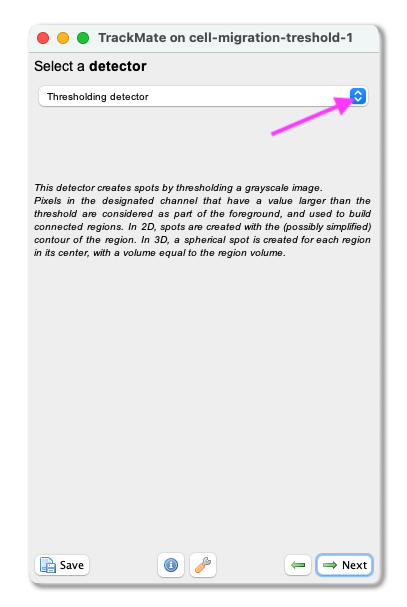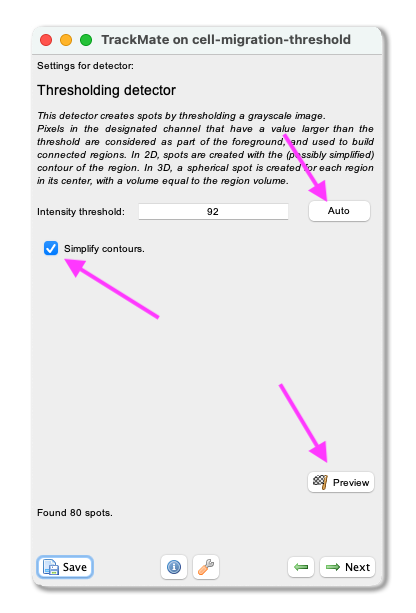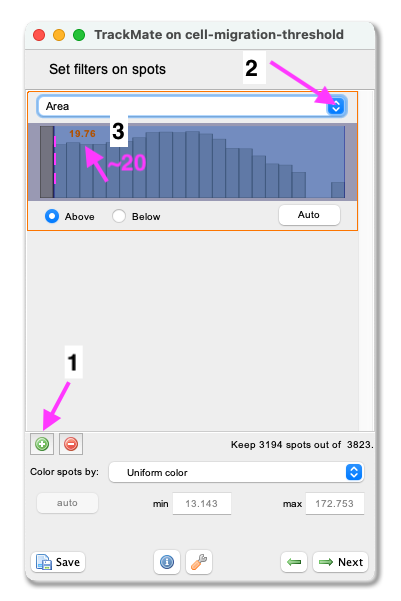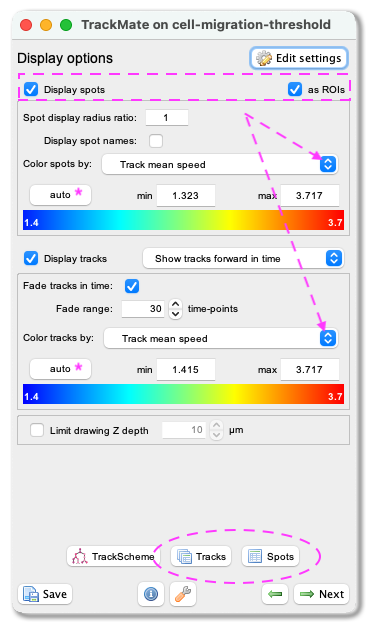Usage
This page describes a detector for TrackMate that creates objects from a grayscale image (it can be one channel in a multi-channel image). You have to specify a threshold value to segment the objects.
Step-by-step tutorial
Download the tutorial dataset from Zenodo:
- Open Fiji.
- Open your image in Fiji.
- Open TrackMate Plugins › Tracking › TrackMate. The start panel will open and display information about your image dimensions. Click
Next. - The Select a detector panel opens. From the pull-down menu, select
Thresholding detector. ClickNext.

- A panel with the description of the detector opens. You can set the threshold yourself or click on the
Autobutton for automatic thresholding. With our test image, the automatic thresholding value is 92. You can also select toSimplify the contoursto smoothen the edges of the segmented objects. By clicking on thePreviewbutton, you will see a preview of the segmentation. On the left, the number of detected objects is displayed. Once a suitable threshold has been chosen, click onNext. - The objects will be detected. Click
Nextagain.

- A panel to filter the detected spots according to their quality opens (more information about this filtering can be found here). With our test image, this part can be ignored. Click
Next. - Next, a panel to filter spots according to their properties (i.e. size, shape, location, or signal intensity) opens. In this exercise, do the following:
- Click the green
+sign at the bottom of the panel - a filter appears. - Click the pull-down menu and select
Area. Here we will filter out the smallest detected objects. Make sure theAbovebutton is selected. - Drag the horizontal line (pink dashed line) to 20. The small objects become invisible.
- Click the green
- Click
Next.

- A tracking panel opens. In this panel, you can select a method for tracking your objects. In this exercise, we use the
LAP tracker. Please select it from the pull-down menu, and clickNext. - A panel for the LAP tracker settings opens. First, with the
Frame to Frame linkingparameter, you give the maximum distance to link two objects between frames. Here use 20 microns. Then, you can choose how many spots can be missing, and they could still be the same track. Tick theAllow gap closingbox and add values: Max distance: 20 microns andMax frame gap: 4. Next, you let TrackMate know if the tracks are allowed to split. Splitting can be caused, for example, due to cell division. Tick the boxAllow track segment splittingand insert value Max distance: 20 microns. Below you will also see settings for Track segment merging. Here this box should remain unticked. ClickNext. - A Track filter panel opens. In this panel, you can filter tracks according to their properties (i.e., length, speed, or location). With our test image, we do not need to filter any tracks. Click
Next.

-
A Track filter panel opens. In this panel, you can filter tracks according to their properties (i.e., length, speed, or location). With our test image, we do not need to filter any tracks. Click
Next. -
Next, a panel with multiple display options appears. Here you can define how the objects and tracks are labelled. In this exercise, we will label the objects and tracks according to their mean speed.
- First, make sure that the
Display spots,as ROIsandDisplay tracksboxes, are ticked. - Select
Track mean speedfrom theColor spots byandColor tracks bypull-down menus and clickauto. - In this panel, you can also export the results as CSV files. Please do so by clicking
Tracksat the bottom of the panel. A window with a lot of data shows up. Ensure you export theSpots(information about the spot) and theTracks(information about the tracks) files. Close the results window and clickNext. - You will see a plot features panel - again, click
Next.

- In the next panel, you can perform multiple operations. For this exercise, we will export a tracking image of our experiment. Then from the pull-down menu, please select
Capture overlay. As you click onExecutebelow, a pop-up window opens. Here you can define the time interval you want to save. You can hide the image if you wish by ticking the boxHide imageand clickOK. TrackMate will generate a video of the experiment. Remember to save the image with File › Save as….
Joanna W. Pylvänäinen - July 2021